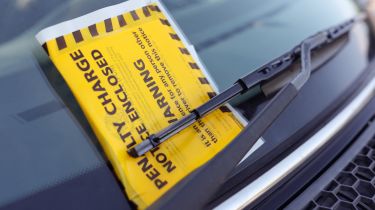Parking with your wheels on the kerb can now cost £100 north of the border – will England’s lawmakers follow suit?
Anyone parking with their wheels on the pavement in Scotland could be liable for a £100 fine, as a new Transport (Scotland) Act rules come into force today.
Under the new law, pavement parking, double parking and parking at dropped kerbs have all been designated as offences punishable by local councils with a £100 fine, albeit reduced to £50 if paid within 14 days. Certain exemptions may be designated by local authorities, for example to allow access for emergency vehicles, but the new rules apply everywhere in Scotland.
According to the Scottish government, the change to the rules will benefit pavement users pushing baby buggies, and pavement users with mobility issues or visual impairments. It may also have an effect on car ownership in urban areas if drivers find their usual parking spots are no longer viable and are forced to give them up. That outcome has not been stated explicitly, but is implied in comments made by Scottish Minister for Transport Fiona Hyslop:
-
UK firm fitting ‘pop bang’ aftermarket exhausts fined in landmark court case
“We’re highlighting the danger that illegal pavement parking poses to pavement users, and in particular those with mobility issues or visual impairments, or parents pushing prams and buggies,” she said. “Scotland is the first of the four nations to make pavement parking illegal nationwide. This change in legislation is a step towards developing communities that are better able to support active travel, building on the work that is already underway to reduce emissions and helping us meet our world-leading climate change targets.”
In the rest of the UK, it’s currently only illegal to park on the kerb in the capital, London. Elsewhere the Highway code recommends only that drivers ‘should not’ do so, and there’s currently no legislation forbidding the practice. That means drivers can only receive a fine if a police officer deems their parking has caused an obstruction, and policing pressures mean problem parkers rarely receive the attention many local residents feel is deserved.
The UK parliament opened an inquiry into the issue of pavement parking in 2020, and there has been sustained lobbying from environmental and disability groups. RAC head of policy Simon Williams believes that MPs and civil servants will be watching the Scottish experience closely to see how the new measures go down with drivers.
-
What’s in the 2023 Autumn Statement for drivers? EV incentives, fuel duty or VAT on charging?
“We very much hope councils don’t rush into handing out tickets but instead focus on educating drivers about the change,” he said.
“While a decision on whether similar measures should be taken in England is still under consideration by the Department for Transport following a consultation in 2020, we are opposed to an outright ban based on our research with drivers. Instead, we would like to see local authorities given enforcement powers to deal with unnecessary obstruction of the pavement.”
Williams said this approach would save tax-payers cash, as England’s councils would be spared the expense of surveying all their roads, working out exemptions and putting new signs and road markings in place.
Do you think these fines should be introduced across the rest of the UK? Tell us in the comments section below…
Source: Read Full Article


 UK firm fitting ‘pop bang’ aftermarket exhausts fined in landmark court case
UK firm fitting ‘pop bang’ aftermarket exhausts fined in landmark court case What’s in the 2023 Autumn Statement for drivers? EV incentives, fuel duty or VAT on charging?
What’s in the 2023 Autumn Statement for drivers? EV incentives, fuel duty or VAT on charging?